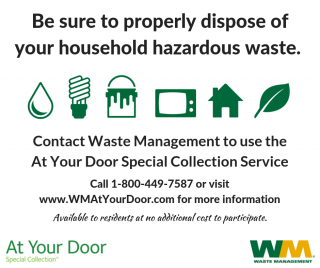
Responsible Disposal: Household Hazardous Waste Tips
Household hazardous waste poses a significant environmental and safety risk if not handled and disposed of properly. Responsible disposal practices are crucial for protecting our communities and the environment. In this comprehensive guide, we’ll explore effective ways to dispose of household hazardous waste responsibly.
Understanding Household Hazardous Waste
Household hazardous waste includes products that are toxic, flammable, corrosive, or reactive. Common items such as paint, batteries, cleaning products, and pesticides fall into this category. Improper disposal of these materials can contaminate soil and water, harm wildlife, and pose risks to human health. Responsible disposal is essential to prevent these negative impacts.
Identifying Household Hazardous Waste Items
Before disposing of household hazardous waste, it’s crucial to identify the items in your home that fall into this category. Walk through each room and gather products like old paint cans, expired medications, cleaning supplies, and electronic devices. Creating a list helps you organize the disposal process and ensures nothing is overlooked.
Researching Local Hazardous Waste Disposal Options
Municipalities often provide specific guidelines and facilities for hazardous waste disposal. Research local regulations and identify designated collection sites, disposal events, or permanent drop-off locations. Contact your local waste management authority or check their website for information on accepted items and disposal procedures.
Separating and Packaging Materials
Once you’ve identified hazardous waste items and researched disposal options, separate the materials into categories. Keep paints, batteries, electronic waste, and chemicals in distinct containers. Ensure each item is properly sealed to prevent leaks during transportation. Some materials may require special packaging to comply with disposal regulations.
Utilizing Hazardous Waste Collection Events
Many communities host hazardous waste collection events where residents can drop off their materials for proper disposal. Take advantage of these events to safely and responsibly dispose of your household hazardous waste. Check the schedule and guidelines provided by your local waste management authority.
Donating or Recycling Usable Items
Some household hazardous waste items, like electronics or unused paint, may still be usable. Explore donation programs or recycling options for these items. Local charities, schools, or recycling centers may accept certain materials, reducing the overall environmental impact and contributing to community initiatives.
Proper Disposal of Medications
Disposing of expired or unused medications properly is crucial for preventing accidental ingestion or environmental contamination. Many pharmacies and law enforcement agencies offer drug take-back programs. Follow their guidelines for secure disposal, or inquire about designated drop-off locations.
Safe Disposal of Electronic Waste
Electronic waste, or e-waste, contains hazardous materials like lead and mercury. Ensure responsible disposal by utilizing electronic recycling programs. Many retailers and electronic manufacturers offer recycling services for old devices. Remove personal data from devices before recycling to protect your privacy.
Managing Paint Disposal
Paint is a common household hazardous waste item with specific disposal requirements. Many municipalities have paint recycling programs or host paint collection events. If the paint is still usable, consider donating it to local community projects or organizations in need of paint for renovations.
Educating Others and Promoting Awareness
Responsible disposal of household hazardous waste goes beyond individual efforts. Educate friends, family, and neighbors about the importance of proper disposal practices. Encourage them to follow guidelines, participate in collection events, and make informed choices to collectively minimize the impact of hazardous waste on the environment.
Explore More Resources on Responsible Disposal
For additional insights into disposing of household hazardous waste responsibly and protecting the environment, visit Dispose of Household Hazardous Waste Responsibly. This resource offers detailed guidance, safety tips, and additional information to empower you in making informed decisions about the disposal of hazardous materials. Taking responsibility for our household waste contributes to a cleaner, safer, and more sustainable community.










